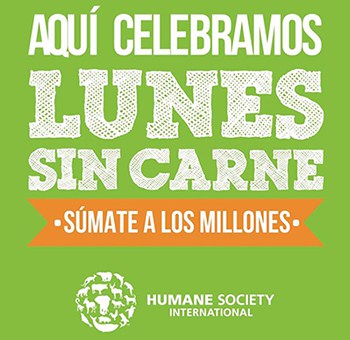Costa Rica is officially joining the global initiative known as “Meatless Monday,” or Lunes sin Carne, meant to reduce meat consumption among the population.
The local office of the animal rights group Humane Society International (HSI) launched the campaign on Earth Day. The initiative began in the U.S. in 2003 aimed at benefiting public health, the environment and animal welfare. More than 35 countries already participate in Meatless Monday.
According to HSI, animal production for human consumption is one of the main contributors to climate change. One-fourth of Costa Rica’s greenhouse gas emissions comes from the livestock sector.
Globally, methane from farting and belching cows accounts for 40 percent of farming’s heat-trapping emissions.
Viviana Bruno, who manages Humane Society International’s Farm Animals Program said joining the initiative is voluntary and that the group is not asking restaurants or companies to eliminate dishes from their menus or stop serving meat.

“We are just asking them to add a meatless option for customers who visit them on Mondays, and to inform them about those options,” Bruno said.
Five restaurants have already joined the Meatless Monday initiative and HSI expects the number to increase.
The group will promote the campaign mostly on social media and through direct contact with restaurants and bars, but also among universities, schools, and other institutions.
HSI will provide participating locales with posters stating “Aquí celebramos Lunes sin Carne” (Here we celebrate Meatless Monday) and waiters will display the message on pins.
The campaign’s Facebook profile also features nutrition info, tips, environmental facts and even vegetarian and vegan recipes.
Mixed reactions
The president of the Costa Rican Cattle Corporation (CORFOGA), Leonardo Luconi, said local farming practices are much less damaging than in many other countries. Therefore, he said, a local Meatless Monday campaign seems unnecessary for environmental purposes.
He said the campaign could negatively affect cattle farmers, thousands of jobs and even public health.
Luconi said those responsible for promoting the campaign here are using facts and figures about methane emitted by ruminant animals that do not apply for Costa Rica.
“We need to be clear about two facts: our animals are fed with grass, not grains like in many other countries, including the U.S.,” he said. He added that “recent studies demonstrate that people who avoid amino acids from animal protein may suffer, among other effects, from lower brain development.”
The chamber leader said local joint research from the Agriculture and Livestock Ministry’s National Institute for Agricultural Innovation (INTA) and the National Meteorological Institute (IMN) conducted on more than 200 farms in the past two years found that “all of them are either carbon neutral or carbon positive.”
Luconi said measurements taken during that research found that actions being implemented to mitigate emissions on local farms go beyond feeding practices.
“Farmers here have good practices, they are mostly using living fences, they are protecting and expanding their forests and their pasture areas, and all those areas are currently fixating carbon,” he said.
There are just over 36,000 cattle farms in Costa Rica and according to CORFOGA, farmers own some 25 percent of forested areas in the country.
Records from the Agriculture and Livestock Ministry state that there are currently 1.8 million hectares of land being used in milk and meat production.
Livestock production accounts for 40 percent of emissions in the farming sector and 24 percent of Costa Rica’s greenhouse gas emissions, according to the Environment Ministry.
However, Luconi said the INTA/IMN study showed that farms are mitigating more greenhouse gas emissions than they are producing.
He also said government officials often conduct carbon fixation measurements on farms whose lands are being used both for cattle production and crops, “but in their final report they classify those farms only as agricultural lands,” Luconi said.
President of the Costa Rican Chamber of Restaurants Jorge Figueroa said Friday that the group supports the Meatless Monday initiative as long as it is not mandatory, as their associates mostly support customers’ freedom of choice.
Figueroa said that if people here want to avoid meat one day a week then restaurants just need to be creative and offer options for them.
“This could be actually a good thing even for steakhouses as they could also join the iniciative and promote dishes for vegetarian or vegan people,” he said.
He also said the campaign would be positive in terms of promoting the production and consumption of vegetables and fruit as well as some products that are not traditionally consumed here, thereby increasing the market for them.
“We believe this can actually be seen even as a good business opportunity for many local producers,” Figueroa said.
Watch a spot of the Meatless Monday campaign in Costa Rica (in Spanish):








